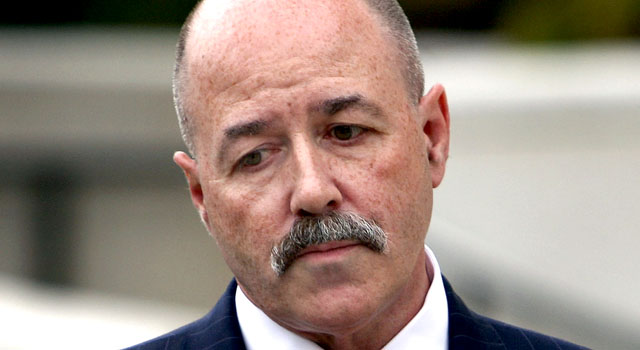The Life And Death Of Bernard Kerik: Examining The Rise And Fall Of A NYPD Figure

Table of Contents
The Meteoric Rise of Bernard Kerik
Early Life and Career
Bernard Kerik's early life, though not extensively documented, laid the groundwork for his future in law enforcement. Born in 1960, his path to becoming a high-ranking NYPD official began with humble beginnings. While specific details of his formative years remain relatively private, it is clear that his dedication and ambition were crucial to his career progression.
- Early Career: Started as a patrol officer in the NYPD, quickly demonstrating diligence and a strong work ethic.
- Education: While formal education details are sparse in public sources, his practical skills and experience fuelled his rapid advancement within the force.
- Notable Achievements: Early recognition for bravery and exceptional performance within the NYPD were instrumental in his early promotions.
Key Achievements and Notable Cases
Kerik's ascent through the ranks of the NYPD was marked by several significant achievements and high-profile cases. His leadership abilities were tested and proven repeatedly, particularly during challenging situations.
- Counter-Terrorism Efforts: Played a vital role in New York City’s counter-terrorism efforts preceding and following 9/11.
- 9/11 Response: His leadership and management skills during the immediate aftermath of the 9/11 terrorist attacks garnered significant praise and national recognition, showcasing his ability to lead under immense pressure.
- Crime Reduction Strategies: Implemented effective crime reduction strategies in several high-crime areas of New York City, resulting in a significant decrease in crime rates.
- Community Policing Initiatives: Successfully implemented community policing initiatives, improving the relationship between the NYPD and the communities it served.
Transition to Homeland Security
Following his remarkable tenure within the NYPD, Kerik's career took a significant turn when he was appointed by President George W. Bush to serve in the Department of Homeland Security (DHS). This marked a pivotal moment, shifting his focus from city-level law enforcement to national security.
- Bush Administration Role: Nominated for the position of Secretary of Homeland Security, a nomination that ultimately failed due to ensuing scandals.
- Key Responsibilities: While his official appointment failed, his contributions to DHS and the national security apparatus remain a part of the discussion about his life and career.
- National Security Focus: He transitioned his expertise in law enforcement to a national security context, facing new challenges related to national and global threat assessment.
The Downfall of Bernard Kerik
Financial Irregularities and Ethical Lapses
Despite Kerik's earlier successes, his career was dramatically derailed by a series of financial irregularities and ethical lapses. These transgressions led to investigations, indictments, and ultimately, his conviction.
- Financial Misconduct: Allegations surfaced regarding improper financial dealings, including tax evasion and failure to disclose income.
- Fraudulent Activities: Investigations revealed instances of fraudulent activities related to his personal finances and business dealings.
- Ethics Violations: His actions were deemed violations of the high ethical standards expected of individuals holding positions of public trust.
- Investigation and Indictment: A comprehensive investigation ensued, culminating in a federal indictment on multiple charges.
Legal Battles and Sentencing
The legal battles that followed were protracted and intensely publicized. The charges against Kerik resulted in a series of court proceedings and eventually a conviction.
- Plea Bargain: Kerik accepted a plea bargain, admitting to some of the charges and avoiding a potentially lengthy trial.
- Prison Sentence: His sentencing resulted in a period of incarceration, serving time in federal prison.
- Legal Representation and Appeals: He received legal representation and pursued appeals, but these efforts were ultimately unsuccessful.
Public Perception and Legacy
Kerik's downfall significantly damaged public trust in law enforcement and government. His story serves as a stark reminder of the consequences of ethical failures and a cautionary tale about the importance of accountability.
- Damage to Public Trust: The revelations surrounding his financial misconduct and ethical lapses eroded public confidence in law enforcement.
- Impact on the NYPD: His case had a significant impact on the reputation of the NYPD, triggering internal reviews and reforms.
- Lessons Learned: His story emphasizes the critical need for transparency and integrity within law enforcement and government.
Conclusion
Bernard Kerik's journey, from a highly decorated NYPD officer to a convicted felon, stands as a poignant example of the fragility of reputation and the far-reaching consequences of ethical failures. His initial successes in counter-terrorism and crime reduction efforts were undeniably significant; however, his subsequent downfall serves as a powerful reminder of the importance of accountability and ethical conduct, particularly in positions of power. Understanding the life and death of Bernard Kerik provides crucial insights into the challenges of maintaining integrity within law enforcement. Continue your research on Bernard Kerik to further explore this complex and cautionary tale.

Featured Posts
-
 Tres Ingredientes Un Plato Aragones Del Siglo Xix
May 31, 2025
Tres Ingredientes Un Plato Aragones Del Siglo Xix
May 31, 2025 -
 Munguias Adverse Drug Test A Denial And The Questions It Raises
May 31, 2025
Munguias Adverse Drug Test A Denial And The Questions It Raises
May 31, 2025 -
 Find Your New Home Two Weeks Of Free Accommodation In A German City
May 31, 2025
Find Your New Home Two Weeks Of Free Accommodation In A German City
May 31, 2025 -
 Pflegekonferenz Bodenseekreis Wichtige Termine Und Themen
May 31, 2025
Pflegekonferenz Bodenseekreis Wichtige Termine Und Themen
May 31, 2025 -
 Why Ai Doesnt Truly Learn And How To Use It Responsibly
May 31, 2025
Why Ai Doesnt Truly Learn And How To Use It Responsibly
May 31, 2025
